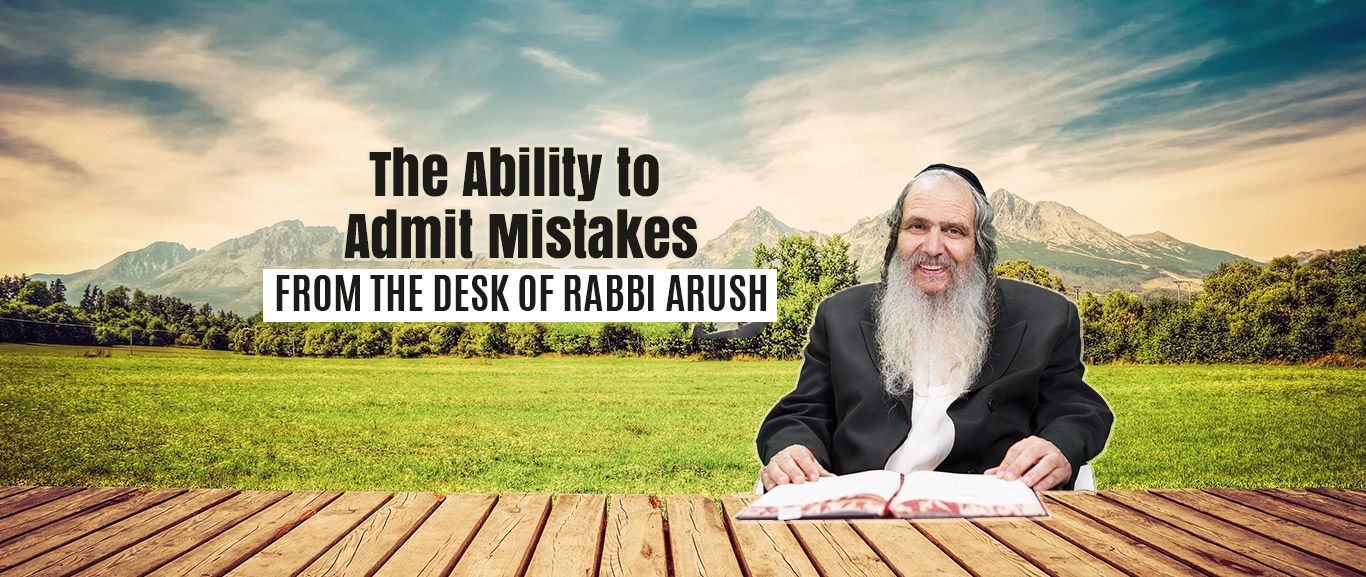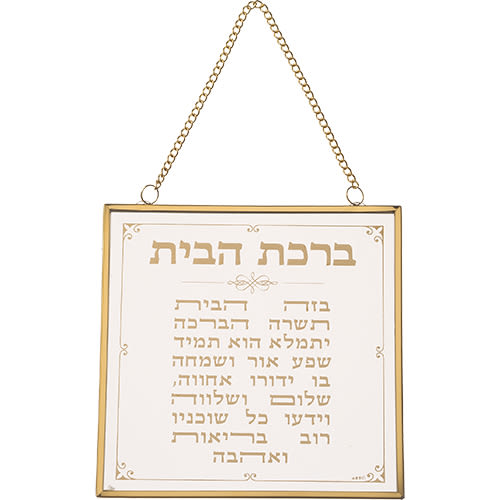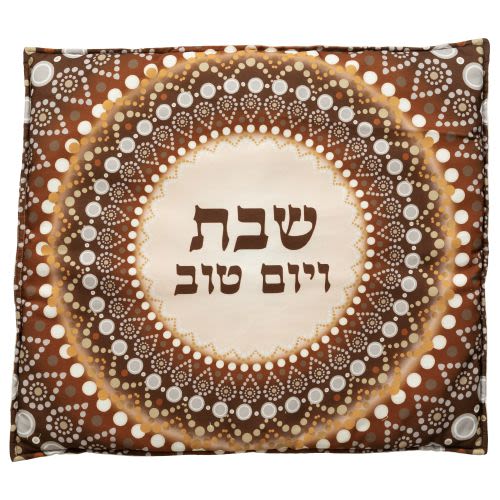
The Ability to Admit Mistakes
Knowing that Hashem always loves you is the basis of everything – from your feelings of self-worth all the way to your bitul to the tzaddik. Your spiritual growth depends on believing how dear you are to Hashem, and that Hashem’s love for you is never endangered.

Translated from Rabbi Arush’s feature article in the weekly Chut shel Chessed newsletter. The articles focus on his main message: “Loving others as yourself” and emuna.
Why Is It So Hard?
Did you ever ask yourselves why it’s so hard for a person to admit he made a mistake? Only great people who are really special – only they, and especially they, from their high level can admit to their mistakes, to consult with those that are beneath them, to listen and to accept the truth from people younger than them, as well as being capable to take their words back.
Among the traits of a wise man mentioned in Pirkei Avot is “admits the truth”, even when he could have claim against it and win the debate. Moshe Rabbeinu makes strong claims against the deeds of the sons of Aharon, but when Aharon argues with him, “Moshe heard, and it was good in his eyes.”1 Chazal say about this: “He admitted and was not ashamed to say, ‘I didn’t hear’, rather – ‘I heard, and I forgot’.”
All the Jewish sages of all generations went in his footsteps and were always paragons of admitting mistakes. As the Pele Yo’etz says, they accepted the truth from the person who said it, even from the smallest of the small, and, to put it somewhat wittily, “Modim d’Rabbanan – that is their praise.” And before him, the Chida wrote: Admits the truth, even if it came from the mouth of children.
In the general world as well, the ability to admit the truth is very appreciated and seen as something truly noble, not at all to be taken for granted, since everyone knows the tremendous difficulty involved – indeed, one must be almost super-human to do it. But we must understand: Why is it so hard?
Self-worth
The answer is simple. Our self-worth is the most precious thing for us – we are willing to fight for it, no matter what the price is! The question is what creates our self-worth, what is it built upon? Among the nations, self-worth is based on the environment, on what other people think of them, and therefore they will do anything to avoid looking bad in the eyes of others, even if it means doing without the truth. For them, it is critical.
But if one’s self-worth is not dependent on other people, then one should have no problem with looking like and being appraised as someone who makes mistakes. It doesn’t harm one’s self-image at all.
That is why the unequivocal knowledge that Hashem yitbarach always loves me, expressed by Rabbi Natan in the statement that every Jew is dear and important in the eyes of Hashem – that knowledge, when one lives it wholly and in the depths of one’s heart – gives a person an eternal, absolute, and independent self-worth, granting him healthy and real self-confidence.
Only such a person can learn from anyone, and consult with anyone, and, of course, admit to a mistake without any desire to win and to argue. So, it was only the greatest of the sages, who had real and complete daat (understanding) who could admit to the truth, admit their mistakes, and take their words back when necessary.
Everything Depends on This
And so, we can say that only someone who truly recognizes his self-worth and has no problem in submitting to those who are smaller than him, and, of course, submit to the truth coming from those who are greater than him – only he can really be able to submit completely to the tzaddik!
To submit to the tzaddik is the greatest thing, and all of Judaism depends on it, as Rabbeinu says in Likutei Moharan: “[It is] the main thing and the foundation, upon which everything depends”2 – there is no other expression like that in all of Likutei Moharan. And what is the main thing? “To connect himself to the tzaddik of the generation, and to accept what he says about anything, big or small, without straying, chas veshalom, from his words, left or right… And to discard all the wisdoms, and to set aside his own daat, as if he has no sechel (intelligence) of his own besides what he receives from the tzaddik and rabbi of his generation.”2
One might misunderstand the concept of “bitul latzaddik” (submission to the tzaddik), thinking that self-negation is the bitul of the talmid’s (disciple’s) self-importance. Chas vechalila. It is precisely the opposite of it! If you are not aware of your own self-importance, you can’t even begin to think of bitul to the tzaddik.
That is why Rabbeinu says that “many are mistaken about the matter of hachna’a (surrendering oneself, submission).” To think that you are small and unimportant – that is not bitul and not hachna’a, but rather “thinking small” (constricted consciousness). And that is the thing furthest from serving Hashem; whereas bitul latzaddik is the complete opposite of that – it is the highest level of gadlut hamochin (expanded consciousness), and the recognition of a person’s worth and importance.
Receiving Daat from a Bar-daat (One Who Possesses Daat)
If this bitul isn’t coming from one’s sense of importance, then how is it expressed? The bitul is to the tzaddik’s sechel and daat, as Rabbeinu emphasizes. To set your daat aside and accept the daat and the sechel of the tzaddik. Hashem loves you and you are very dear and important to him; there is no difference between the love He has for you and the love He has for the tzaddik. But Hashem yitbarach sends down to this world sechel and daat through the holy Torah and through the tzaddikim who are connected to the Torah, and that is why one must submit to their daat.
And even if you have learned much Torah and acquired daat, you still must listen to what your friends and students have to say, and set aside your daat in the face of theirs when you see that they are right, and even more so should you set aside your daat in face of that of your superiors.
And this is possible only if you know that your self-worth is absolute, eternal, and independent.
If everything is dependent on your bitul to the tzaddik, and the bitul to the tzaddik is itself dependent on your recognizing your own worth and importance, that we find that everything is dependent on your knowing that Hashem yitbarach always loves you!
They Will Seek Torah from Him
As we have already said in the past, and it is important to mention it repeatedly, we cannot understand nor grasp the level of the holy brothers, the Tribes of Israel, and we are not talking about them at all. But it is permitted and even incumbent upon us to learn simple moral lessons from the stories in the Torah, and especially when it comes to things that we have already received from our sages. Based on this, let us take another look at the story of Yosef and his brothers.
Yosef is the tzaddik to whom all the brothers were supposed to be submit to, as in his dream in which all the brothers were bowing down to him – in other words, submitting to him and receiving from him – and if they would have done so, the complete Geula would have come right there and then.
And here too, in our parasha (weekly Torah reading), the brothers see that all his dreams have come true, and they see his greatness in that he doesn’t hate them, is not angry with them, and is not seeking revenge. All this is out of a perfect emuna that Hashem does and did for him only good, and everything that they tried and planned and did really doesn’t count at all. They should have understood and recognized Yosef Hatzaddik’s immense daat, and at least at this point should have asked him to teach them and accepted him as their teacher!
But whatever level one is on, it is a very difficult nisayon (test) to relinquish your opinion and to admit to the truth that there is someone who had the merit to understand and receive the Torah and the complete da’at from Yaakov Avinu. It is very hard to admit that there is someone who is better and more successful and smarter than you, especially if he is younger or if he comes from a different background. It made the brothers feel as if they are less important and less dear to Hashem, chalila.
If your importance stems from the fact that you are a firstborn, or one of the elder brothers, or son of the first wife, or superior to others due to any other external factor, it is really hard to give up that feeling of importance and your status and recognize the fact that there is someone better than you.
To Be a Vessel for Wisdom
That is why it was very hard for Rabbi Akiva’s colleagues to submit to his opinion, for he was some sort of baal teshuva, having started learning Torah only at age 40, coming from a family totally lacking in important lineage. It was very hard for them to admit that he had more wisdom and intelligence than they had. If they would have submitted to him, they too would have entered the Pardes and come out safely.3
When a Jew knows how important and dear he is in the eyes of Hashem yitbarach, and that Hashem’s love for him is never endangered, and there is no reason to fear for his status and absolute worth – then of course he is able to learn wisdom from any person and to hear the truth no matter who is saying it, without any fear and without the barrier of pride blocking him. Only he can merit receiving true wisdom and connection with true wisdom and intelligence.
This is a deep point in the matter of submitting to the tzaddik: submitting to a tzaddik doesn’t mean that you are worthless; not at all! Submission to a tzaddik is possible only when you know you are loved and beloved and important and dear to Hashem, and you are sure of that. Only then can you receive wisdom from the tzaddik, because you will be submitting yourself to him only in the matters of his wisdom and intelligence.
Editor’s Notes:
1 Vayikra (Leviticus) 10:20
2 Likutei Moharan 123
3 Chagiga 14b. See Four Who Entered the Orchard for Rabbi Arush’s explanation.












Tell us what you think!
Thank you for your comment!
It will be published after approval by the Editor.